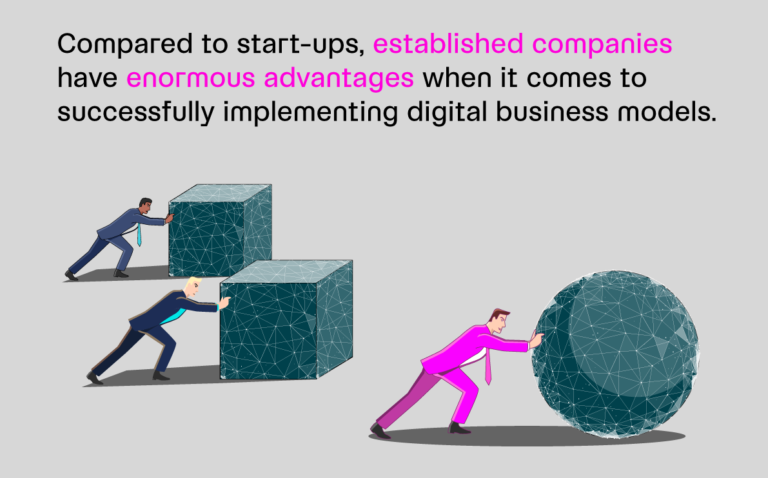Philipp Noack – Co-founder of Venture Leap. Philipp has been working in the startup industry since 2008 and has seen both sides of the table from Venture Capital to Founder and Executive in numerous projects. Here he shares some of his personal experiences.

They say it takes a village to raise a child. The same could also be said about creating a successful business. It takes a lot of different talents and skills to take something from an idea, develop a product, and then build a profitable business around the digital product. One person can’t do it by themselves.
When I started my first online business I was confronted with exactly that question “How do I go about developing this?” My background is business administration and I worked in Venture Capital and Consulting in my earlier days. Working with entrepreneurs gave me a lot of exposure to how to create a digital business but it did not prepare me for the challenges of building a digital product from a technical point of view let alone manage a development team.
At some point it became very clear to me that I could not do this without help on the technical side. So I saw three options:
- Learn how to code myself
- Find a technical co-founder
- Get outside help
1. Learn how to code
There are a myriad of free and paid courses out there that help you acquire the skills you need to get into coding. But often speed is of the essence when it comes to bringing an idea to market. Learning how to code was unfortunately not an option for me. Though this should not discourage you at all from picking up some valuable technical knowledge.
Knowing how to read code is excellent even if you can’t code yourself, it will help you evaluate the work of others.
2. Find a technical co-founder
My first hunch was to go on the hunt for that unicorn tech co-founder: Years of experience, knows product, UI/UX, can do front and back end development, business savvy and of course was willing to work for equity.
Guess how that turned out…
Over the years I worked with quite a few StartUps and while many startups understand the need for collaboration, they often get stuck trying to find the right technical co-founder.
Unfortunately, this is also the step where many businesses fail, or plant the seeds for a later failure. So let’s get into this a little deeper.
What does a technical co-founder do for your business
The theory behind finding a technical co-founder is that the co-founder will have the skills to develop the product that their partner came up with. However, this is far from the reality.
The best digital products are the work of multiple specialists. A technical co-founder who is an excellent coder may still lack the skills to bring your vision fully to life.
The reality is that even the best technical co-founders will still need to bring in other technical experts.
Problems with looking for a single person
There are several problems with pinning all your hopes on a single technical co-founder. One issue is that before you have even attracted an investor, you have significantly diluted your control over the business. A co-founder will want more than just an equity stake in the project. They often will want a say in operations and business decisions.
This is one reason so many startups fail, the co-founders can’t agree on a clear path forward.
Another issue is that technical co-founders do not guarantee the development of a successful digital product. You will still need a team of experts, and you may not even know what experts you need until the product has been in development for a while.
One more important issue is, they are simply not available on the market. And while there are a handful of excellent developers out there that come straight out of university. They have so many tempting options from Facebook, Google and other very well funded startups, that in 99% of the time you can’t compete.
Remember, ideas are worth nothing – so tempting someone with equity that is not worth anything at the time will not get you that developer who wants to break away from Google after ten years (exceptions do exist, I’m not denying that).
3. Get outside help: agency vs digital product studio
When you seek outside help, you need to know what you are looking for and ask yourself these questions in order to find the right partner. This is a hard learned lesson I had to learn, as I did not ask myself these questions in the beginning:
- Do I know how to translate my product vision into technical terms?
- Do I know how to manage and communicate with a technical team?
- Am I clear on my core features for my MVP?
- If yes, have I actually tested these assumptions?
If you can answer all of these questions with a confident yes, maybe you can work with a regular software development agency. If not, have a closer look at our approach: The digital product studio.
But before we dive into that, let me share with you my experience with software development agencies.
Working with a software development agency
In the end I decided to work with an agency where I had access to a remote developer. Now remember what I wrote earlier: I had no idea how to manage a technical team. Nonetheless the agency let me manage “my” developer directly but with no input or advice concerning:
- How can I translate my product vision into technical terms
- Are the features I requested realistic compared to my budget
- Was it even making sense what I wanted to get done
In the end something was developed, it was expensive, it was buggy and no matter what fancy features I came up with, the conversion rate did not change a bit. It was frustrating. I changed the agency, but the results did not change. More money down the drain, threats of lawsuits and a product launch that was delayed by 9 months.
So what could be the alternative?
The digital product studio as your technical co-founder
Over the last 8 years I worked with a lot of startups in the early stages development. We often relied on software development agencies during that phase, but whenever we did not have a technical counterpart in the team, results were mostly disappointing.
So, what are you supposed to do when you have a brilliant idea, but you lack the technical expertise to pull it off?
In 2019 I partnered up with my good friend Daniel to fix this problem and bring our common vision to life: digital products – done right!
As a digital products studio we have the in-house expertise to bring your idea to life. We are not limited to a single skill set. Our team combines the experience from working with hundreds of different companies. Therefore we know what works and what doesn’t.
As a digital products studio we are flexible with compensation, after the first fixed price MVP, we can talk about an IT 4 Equity deal. Working with a partner like us allows you to get the technical expertise you need, without giving up as much or even any control as you would have to when working with a single person as a co-founder.
Even the best technical co-founders will lack the depth of business and technical experience that a studio will bring to your product.
If you are serious about building a profitable digital product, it makes sense to partner with a studio with a successful track record instead of someone who may be a brilliant engineer but has never brought something from the whiteboard to the real world.
Want to learn more about working with a digital product studio as a technical co-founder? Click here.




